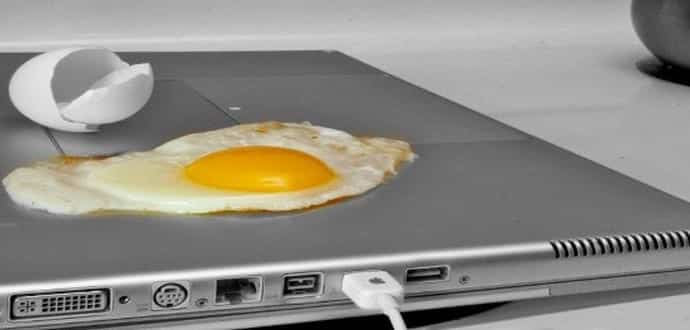Why does my laptop get so hot ?
Why Does My Laptop Overheat And How To Fix It?
Laptops tend to get much hotter than desktops leaving most people wondering why my laptop gets so hot ? The heat can vary a lot as per people’s perceptions. Irrespective of the reasons, if your laptop is getting too hot to handle, there is always a possibility of something not working as it should be.
Reasons for the overheat
We all know laptops have air vents to let the hot air to be blown out by the fans but what about the fan itself ? If you have opened up the covering of your machine, you would have noticed the amount of dust that gets collected inside the laptop – around the fan and other components. The more the dust, the less efficient will the fans be. Another reason of this, could be the placing of your laptop in a naturally hot environment. If your workdesk is adjacent to another appliance that tends to heat up quickly or in direct sunlight, it just might be the laptop absorbing all that ambient heat.
Another very common cause, is using the laptop on your bed thus, blocking the vents and trapping the heat inside your laptop. Or maybe the software that’s running on the machine is very resource hungry and is utilizing your laptop’s processor to its limit. This is more common than you’d think especially with media intensive software.
Solutions
While laptop heating might be a major hindrance at times, the ways to combat it are also in plenty. The first step should be to determine if your laptop is genuinely overheating or its just hot. Laptops are supposed to get hot. However, if the heat is causing it to shut down, run significantly slower or making you suffer through the blue screen of death , then you have a serious issue at hand. If you have a Macbook, they generally come with in-built fail safes to ensure the laptop shuts off when it reaches a dangerous temperature. On a windows machine however, you might want to download third-party tools to check the temperature of your machine.
Once you’re sure the heat is too much, try keeping your hand near the vents to see if there’s air blowing out. If it is, it means the fan is working fine. However, if you don’t feel the air blowing or find it blowing lesser air than usual, the vents might be blocked. If your comfortable with it, you should unscrew the back and try opening up the laptop and clean the dust. If not, consider getting the laptop checked out.
Like mentioned before, your laptop might just be absorbing radiant heat, in which case, try moving your machine to a different spot and notice if that makes a difference. If you like using your laptop on your bed, consider getting a lap desk. This will ensure the vents do not get blocked up and the air circulates like its supposed to.
Lastly, keep a watchful eye on those intensive processes. If there is one process in particular that’s eating a lot of resources, try keeping the number of processes running simultaneously at a minimum. If you find your machine heating up even though you aren’t running an intensive process, there might a background process that’s eating up your machine’s resources without you even knowing. In which case, open up the task manager and end it.
Hopefully these tips will be helpful to keep your beloved laptop running along at a comfortable temperature.


![How To Read Deleted WhatsApp Messages? [Working 2019]](https://blogger.googleusercontent.com/img/b/R29vZ2xl/AVvXsEjekX46Bu79o0XT2nwhL6Uj7SDzew-iP1dqXflRQfAwyVLJE7QWkN8LIRUADV4P8Y5fTvj46B074-hlZ9XMdsbxz9HYYG9vgqgFqFSZf62dFHf-_34bhwFHfEy8iUkJIiEYdNyw1iur7eEO/w680/How-To-Read-Deleted-WahtsApp-Messages-696x414.jpg)


0 Comments